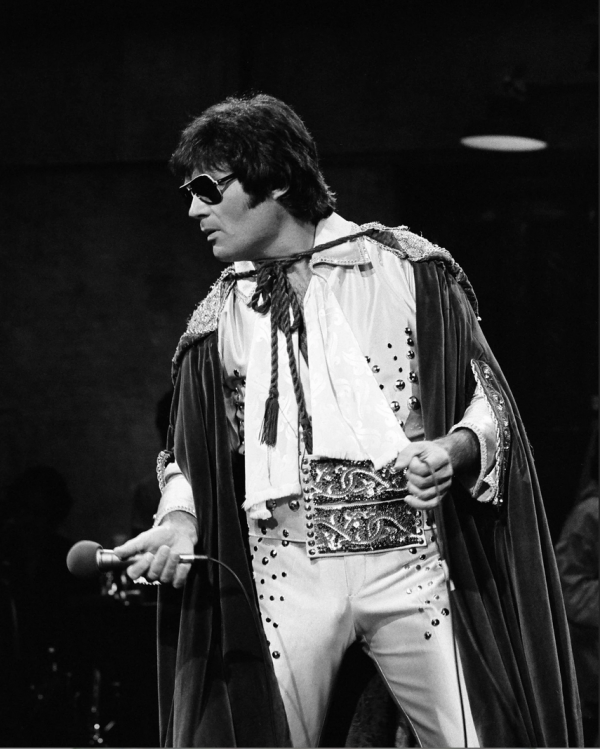 Fred Willard as Elvis Presley on SNL circa 1978
Fred Willard as Elvis Presley on SNL circa 1978
NEW YORK TIMES: Fred Willard, the Emmy Award-nominated comic actor best known for his scene-stealing roles in Christopher Guest’s improvised ensemble film comedies like “Best in Show” and “Waiting for Guffman” and on sitcoms like “Modern Family” and “Everybody Loves Raymond,” died on Friday at his home in Los Angeles. He was 86. His death was confirmed by his agent, Mike Eisenstadt. No specific cause was given. Mr. Willard made an art of playing characters who, as The New Yorker once noted, are “gloriously out of their depth.”
There was Buck Laughlin, the dog-show announcer in Mr. Guest’s “Best in Show” (2000), who wondered why breeders didn’t want miniature schnauzers to be larger, believed that Christopher Columbus had captained the Mayflower and thought the perfect lighthearted comment to make as the terriers made their entrance was, “To think that in some countries these dogs are eaten.”Mr. Willard received best supporting actor nominations for the role from the National Society of Film Critics and the New York Film Critics Circle.
There was Ron Albertson, a travel agent trying his hand at community theater, in “Waiting for Guffman” (1996). When Ron wants a doctor acquaintance’s medical opinion, he begins to unzip his pants in the middle of dinner at a Chinese restaurant. And there was Mike LaFontaine, a laughably crude show business manager, in “A Mighty Wind” “ (2003). In “Anchorman: The Legend of Ron Burgundy” (2004), Mr. Willard was the news-station producer who horrified Ron (Will Ferrell) by promoting a woman to co-anchor. The producer had problems of his own: His son was the kind of teenager who might have a bad day and take a marching band hostage. MORE
NEW YORK TIMES: With his light comedic touch, Fred Willard, who died Friday at 86, made getting laughs seem effortless. His string of now-familiar characters — a daffy late-night sidekick, a blundering dog show announcer — were exaggerated extensions of himself. They were obviously goofier and less self-aware than the real-life Willard was, but they evinced the same kind and cheerful manner he displayed in interviews and on talk show couches. It wasn’t until he stepped outside of his comedy comfort zone that his talent became more clear — when he played the rigid, religious Hank MacDougall on “Everybody Loves Raymond,” for instance, earning three Emmy nominations. In his later years, Willard had entered a dad phase — playing fathers, grandfathers and great-grandfathers (or all three, as he did across all 11 seasons of “Modern Family,” which also earned him an Emmy nomination). Despite the awards recognition, Willard had more range than those sitcoms suggest. His next (and last) show, “Space Force,” won’t be available on Netflix until later this month. Fortunately, much of his best work is streaming right now. MORE
NEW YORKER: Christopher Guest, the writer-director of “Best in Show,” as well as the Willard showcases “Waiting for Guffman” and “A Mighty Wind,” has observed that “Fred has the patent on characters who are comfortable in their stupidity.” Away from the cameras, however, Willard is a scholar of vanished luminescence. He pores over photos of bygone buildings and makes pilgrimages to places like the intersection near Bakersfield where James Dean’s Porsche got rammed and the motel in South Los Angeles where Sam Cooke was shot. […]
“A few years ago,” he said, after a moment, “I was in Cleveland, where I grew up, and I looked up my dad’s death certificate at City Hall. I was twelve when he died, in 1951. He died after dropping off Christmas gifts to a customer—he worked at a financing company, it was all a little vague. They said he usually turned to wave after he got in his car, and this time he didn’t. Heart failure. I went down to the intersection listed on the certificate, a Buick dealership, and it was very touching. He was Fred Willard, and I was Fred Willard. He was a pretty stern guy, though. I don’t remember much joking, never much encouragement. My wife hates all these visits, going to see the graves. ‘The people aren’t there!’ she says. And I say, ‘But this is the closest we can get to them.’ ” He gazed out at Times Square, perhaps seeing past the JumboTron dazzle to the Tenderloin of decades past. “If it was up to me, nothing would ever change, no one would ever die. On the other hand,” he added, “then no one could have babies, either, because it would get too crowded.” MORE
